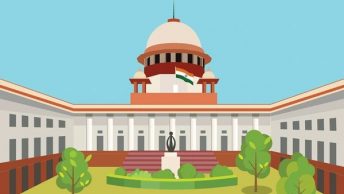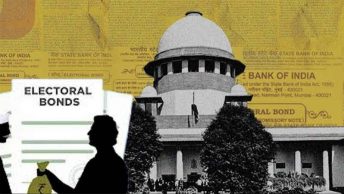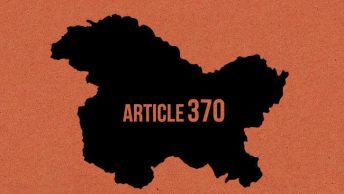This post is part of a series on constitutional and political questions relevant to contemporary times written by Sughosh Joshi, who is working on civic education and engagement. Sughosh also publishes a weekly substack newsletter called ‘In the Matter of the Republic’, you can check it out here and subscribe to it for regular updates.
Yes, bribery is wrong. But is taking a bribe and not following through on the promise worse? This was the essence of the question before the Supreme Court of India last week in Sita Soren v. Union of India (Sita Soren). A seven-judge bench overturned the controversial P.V. Narsimha Rao v. State (P.V. Narsimha Rao) case, which protected legislators who took bribes for voting on the floor of the House from prosecution for corruption, but not those who gave the bribes. This post shall cover the facts of the Sita Soren case and what the Court said.
Facts of the Case
An election to a Rajya Sabha seat was held in Jharkhand on 30th March 2012. Sita Soren, an MLA of the Jharkhand Mukti Morcha had allegedly accepted a bribe given by an independent candidate to the election for the Rajya Sabha seat. Eventually, she voted for her own party’s candidate, thus, not adhering to the agreement at the time of allegedly accepting the bribe. The round of election, which took place on 30th March, was annulled and Sita Soren voted for her own party’s candidate again in the next round.
Criminal proceedings were instituted against Sita Soren and a chargesheet was filed. She approached the Jharkhand High Court seeking quashing of the chargesheet and proceedings. The High Court held that since she did not vote in favour of the bribe-giver, she was not entitled to protection of privilege under Article 194(2). (One can read more about privileges on this substack here.) Sita Soren approached the Supreme Court and the case went through the motions of being heard by four different benches over almost a decade.
The case was first heard by a bench of two judges which then referred the matter on 23rd September 2014 to a bench of three judges. The bench of three judges considered it and decided on 7th March 2019 that “having regard to the wide ramification of the question that has arisen, the doubts raised and the issue being a matter of public importance” a five-judge bench must consider it. Finally, on 20th September 2023, the five-judge bench said that the P.V. Narsimha Rao case would need reconsideration and since that case was decided by a five-judge bench, a larger bench would also require to hear it.
What the SC said
Understanding of Privileges
The Supreme Court laid the context for privileges in India. While including Articles 105 and 194 in the Constitution, according to the SC
“The members of the Constituent Assembly were therefore keenly aware that their privileges under the colonial rule were not ‘ancient and undoubted’ like the House of Commons in the UK but a statutory grant made by successive enactments and assertion by legislatures.”
The SC undertook a functional analysis of the privileges of legislators and concluded
“that the privileges which accrue to members of the House individually are not an end in themselves. The purpose which privileges serve is that they are necessary for the House and its committees to function. Therefore, we may understand parliamentary privileges as those rights and immunities which allow the orderly, democratic, and smooth functioning of Parliament and without which the essential functioning of the House would be violated.”
Considering this background of privileges and the purpose for which legislators have been granted privileges for their speech and actions in the legislature, the Supreme Court arrived at a test of “necessity.” According to this test, whether a legislator has a privilege depends on whether that purported privilege is essential and necessary to the orderly functioning of the House or its committee.
Bribery is not protected by privilege
While holding that bribery is not protected by the privilege of legislators, the SC read the phrase “in respect of” to not hold a wide scope. The Court in P.V. Narsimha Rao had considered that anything that had a connection to a vote given or speech made in Parliament was protected by the privilege of the legislator. This logic allowed the Court to conclude that a bribe accepted for voting in a particular manner was in respect of the vote. It further allowed the Court to hold that if a member did not act as per the agreement, the protection would cease since the bribe would no longer be in respect of the vote cast by the member. The Court rejected this notion and held that bribery for vote or speech will not be considered “in respect of” such vote or speech for Articles 105 and 194. Further, “delivery of results” of the bribe was also an irrelevant consideration for constituting an offence of bribery.
Accepting the proposition that a member of legislature can escape punishment for bribery as long as it was connected with their speech or vote in the House would mean creating a parallel system for such members. It would create a separate class of citizens, grossly contradictory to the principle of rule of law – that everyone is equal before the law.
What next?
It is important to understand why the Supreme Court has to decide on such a case in the first place. Despite Article 105(3) empowering Parliament and Article 194(3) empowering state Legislatures to codify privileges, and several scholars reiterating this requirement, there is no consolidated list of privileges available.
Therefore, it becomes easy for legislators to claim that they have privilege against the actions of law enforcement agencies or Courts. Similarly, legislators will continue to get away with blatant hate speech simply because the words were uttered on the floor of the House. It is, therefore, necessary for the Parliament and all state Legislatures to enact laws in this regard. Till such point, Courts will have to answer questions such as this – is taking a bribe and not following through on the promise worse than taking a bribe?
Sughosh is working on civic education and engagement. He is deeply interested in Constitutional Law, Politics and Policy. He graduated from NALSAR University of Law.







[…] Posted bySughosh Joshi […]